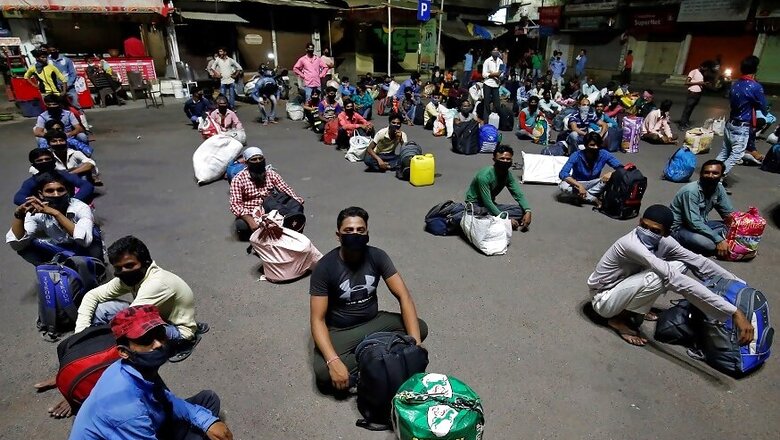
views
The 16 workers who died on Friday would have continued to walk for at least another 120km had they not slept from exhaustion on railway tracks after covering 45km on foot.
According to a study published on Thursday, over 40 migrant workers have lost their lives on roads while trying to reach their homes during the current lockdown.
Ashif Sheikh, who runs a civil society organisation, Jan Sahas that works for the rights of excluded communities, has been closely working with various agencies, including some from state departments, to study and help the migrant workers whose distress with each passing day seems only to be increasing.
In an interview with News18, Sheikh talked about the anxieties that lakhs of migrant workers are facing right now and the possible solutions to ease their pain.
You had nearly a month ago come out with a report on the state of migrant workers in the country. Nearly 40 per cent of them had said that they had nothing to eat. What other concerns did the migrant labourers express?
Concerns over employment were quite high. Lakhs of people who migrated from small towns and villages to big cities have gone back to their native places or are in the process of doing so.
It will be premature to talk about time periods right now, the situation is changing very rapidly. But one thing that is clear is that rural India where lakhs of people will eventually return to, will be under a huge financial stress.
Job sector in cities will open up again, but in rural areas the supply will be immense and the demand quite low. This imbalance will show itself in a lot of spheres. To return to your question, every migrant worker will be desperately looking for a job. That will be their top priority.
What are the alternatives before the government according to you?
There are thousands of people in various central and state labour departments. But despite their strength, they cannot reach out to 14 crore migrant workers of this country. The first step towards helping the migrant workers will begin from making this admission and proceeding from there.
You are suggesting that state and central governments will have to work with other agencies?
Yes, multiple agencies have to come together if this problem of migrant workers is to be solved. The government or any other entity alone cannot do this. You need industry, investors, labour unions, civil society members and labour department officials on your side.
Say it happens, what long and short-term measures can be taken then?
First of all, we need to find a way to disburse the amount that the Centre talked about – the Building and Other Construction Workers' (BOCW) Welfare Fund in that the government claimed had a corpus of Rs 32,000 crore – to the workers.
A lot of people don’t realise that while this fund is theoretically meant for the workers, there are a lot of reasons because of which it doesn’t reach people it’s supposed to help.
One reason being that workers have to go through a long registration process. And registration in, say Jhansi, where a worker may come from, will not help him in Delhi, where he eventually may have landed a job.
It’s a cumbersome process but if all the entities come together, we can surely find a way to transfer this fund to the workers’ accounts immediately.
Now, the long-term measures that can be taken for the workers once everyone is on board. For instance, the government can try to find ways to put pressure on investors and the industry at large to ensure that wherever they launch a project, workers are adequately compensated and insured.
Unless it becomes a priority for the investors, they will not do it. But if these measures are taken it will benefit everyone in the long term.
Of the 14 crore migrant workers, 5 crore are employed in the construction sector alone. If changes are to be brought to the lives of migrant labourers, big reforms will have to be undertaken in this sector.



















Comments
0 comment